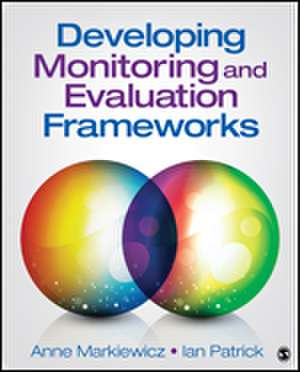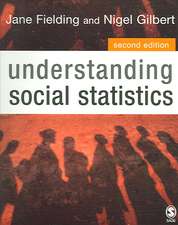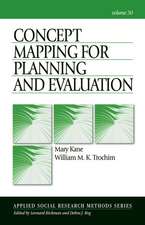Developing Monitoring and Evaluation Frameworks
Autor Anne Markiewicz, Ian Patricken Limba Engleză Paperback – 2 sep 2015
Preț: 407.05 lei
Preț vechi: 521.86 lei
-22% Nou
Puncte Express: 611
Preț estimativ în valută:
77.90€ • 81.03$ • 64.31£
77.90€ • 81.03$ • 64.31£
Carte disponibilă
Livrare economică 24 martie-07 aprilie
Livrare express 08-14 martie pentru 31.96 lei
Preluare comenzi: 021 569.72.76
Specificații
ISBN-13: 9781483358338
ISBN-10: 148335833X
Pagini: 312
Dimensiuni: 187 x 232 x 27 mm
Greutate: 0.52 kg
Ediția:First Edition
Editura: SAGE Publications
Colecția Sage Publications, Inc
Locul publicării:Thousand Oaks, United States
ISBN-10: 148335833X
Pagini: 312
Dimensiuni: 187 x 232 x 27 mm
Greutate: 0.52 kg
Ediția:First Edition
Editura: SAGE Publications
Colecția Sage Publications, Inc
Locul publicării:Thousand Oaks, United States
Recenzii
“The text provides an excellent resource for developing monitoring and evaluation frameworks for a wide range of organizations and programs. Students and practitioners are provided with a great resource that can help organizations better society, and maximize evaluation efficiency by integrating monitoring with evaluation.”
This book does a brilliant job of integrating program monitoring concepts into the broader field of evaluation. It fills a glaring gap in the evaluation literature, and I highly recommend it for practicing evaluators, evaluation scholars, and evaluation faculty and students.
At last--a step-by-step guide to realizing the potential of monitoring and evaluation by building them in from the beginning. This book provides a systematic and well-tested approach to planning and successfully implementing an integrated monitoring and evaluation framework.
This book does a brilliant job of integrating program monitoring concepts into the broader field of evaluation. It fills a glaring gap in the evaluation literature, and I highly recommend it for practicing evaluators, evaluation scholars, and evaluation faculty and students.
At last--a step-by-step guide to realizing the potential of monitoring and evaluation by building them in from the beginning. This book provides a systematic and well-tested approach to planning and successfully implementing an integrated monitoring and evaluation framework.
Cuprins
Preface
Acknowledgments
About the Authors
Chapter 1 Introduction to Developing Monitoring and Evaluation Frameworks
What Is a Monitoring and Evaluation Framework?
Why Invest?
What Functions Does a Monitoring and Evaluation Framework Serve?
What Gap Does This Text Intend to Fill?
Key Features of the Approach
Program-Level Focus
What Are the Differences Between Monitoring and Evaluation?
What Are the Complementaries Between Monitoring and Evaluation?
What is Included in a Monitoring and Evaluation Framework?
Format and Layout of the Text
Chapter 2 Foundation Concepts
1. Multiple Purposes for Monitoring and Evaluation
2. Results-Based Management Approach
3. Theory-Based Approach
4. Evaluation-Led Monitoring and Evaluation
5. Participatory Orientation
Chapter 3 First Steps: Scoping the Monitoring and Evaluation Framework, Stakeholder Mapping and Evaluation Capacity Building
1. Introduction to Scoping the Framework With Key Stakeholders
2. Key Steps in Scoping the Framework
Step 1: Identify Requirements
Step 2: Determine Participation Arrangements
Step 3: Identify Possible and Preferred Approaches
Step 4: Review Resource Parameters
Step 5: Confirm Purpose and Parameters of the Framework
3. From First Steps Onwards
SUMMARY CHECKLIST
CHAPTER REVIEW QUESTIONS
Chapter 4 Program Theory and Program Logic as a Foundation for the Monitoring and Evaluation Framework
1. Introduction to Developing Program Theory and Program Logic
2. Steps Involved in Developing Program Theory and Program Logic
Step 1: Plan Stakeholder Engagement Strategy
Step 2: Develop Program Theory
Step 3: Develop Program Logic
Step 4: Confirm Program Theory and Program Logic with Key Stakeholders
SUMMARY CHECKLIST
CHAPTER REVIEW QUESTIONS
Chapter 5 Evaluation Questions - Determining What We Want to Know
1. Introduction to Developing Evaluation Questions
2. Using Evaluation Domains to Guide Selection of Questions
3. Using Program Theory and Logic to Determine Evaluation Questions
4. Steps Involved in Developing Evaluation Questions
Step 1: Develop Draft Evaluation Questions
Step 2: Facilitate Stakeholder Participation
Step 3: Scope Number and Range of Questions Against Data and Resources Available
Step 4: Present Questions to Stakeholders for Final Endorsement
Step 5: Finalize Evaluation Questions
SUMMARY CHECKLIST
CHAPTER REVIEW QUESTIONS
Chapter 6 The Monitoring Plan
1. Introduction
2. Introduction to Program Monitoring
3. The Monitoring Plan
4. Steps in Developing Monitoring Plan
Step 1: Identify Focus
Step 2: Develop Performance Indicators and Targets
Step 3: Identify Data Collection Processes and Tools
Step 4: Determine Responsibilities and Time Frames
5. The Future of Program Monitoring
SUMMARY CHECKLIST
CHAPTER REVIEW QUESTIONS
Chapter 7 The Evaluation Plan
1. Introduction
2. Focusing on Evaluation
3. The Evaluation Plan
4. Steps Involved in Developing the Evaluation Plan
Step 1: Determine Overall Evaluation Approach
Step 2: Identify Evaluation Questions Requiring Criteria and Standards
Step 3: Identify Focus of Evaluation and Methods for Each Questions
Step 4: Determine Responsibilities and Time Frames
Step 5: Review the Monitoring and Evaluation Plans
SUMMARY CHECKLIST
CHAPTER REVIEW QUESTIONS
Chapter 8 Collecting, Managing, Analyzing and Synthesizing Data to Reach Evaluative Conclusions
1. Introduction to Data Processes That Support Sound Conclusions
2. Organizational Context for Data Collection, Management, and Analysis
3. Data Quality
4. Steps Involved in Data Collection, Management and Analysis
Step 1: Develop Data Collection Plan
Step 2: Develop Data Management Plan
Step 3: Consider Approach to Data Synthesis
Step 4: Consider Approach to Making Evaluative Judgments and Reaching Evaluative Conclusions
SUMMARY CHECKLIST
CHAPTER REVIEW QUESTIONS
Chapter 9 Learning, Reporting and Dissemination Strategies
1. Introduction
2. Steps Involved in Learning, Reporting and Dissemination
Step 1: Consider Developing or Refining a Learning Strategy That Maximizes Use of Conclusions, Recommendations and Lessons
Step 2: Consider the Identification of Recommendations and Lessons
Step 3: Provide Guidance on Developing a Reporting and Dissemination Strategy
SUMMARY CHECKLIST
CHAPTER REVIEW QUESITONS
Chapter 10 Planning for Implementation of Monitoring and Evaluation Frameworks
1. Introduction to Planning and Implementation
2. Key Steps in Implementation of Monitoring and Evaluation Frameworks
Step 1: Confirm Program Management Arrangements
Step 2: Work Planning for Implementation
Step 3: Plan for Monitoring and Review of Framework
SUMMARY CHECKLIST
CHAPTER REVIEW QUESITONS
Chapter 11 Conclusion
Appendix
References
Index
Acknowledgments
About the Authors
Chapter 1 Introduction to Developing Monitoring and Evaluation Frameworks
What Is a Monitoring and Evaluation Framework?
Why Invest?
What Functions Does a Monitoring and Evaluation Framework Serve?
What Gap Does This Text Intend to Fill?
Key Features of the Approach
Program-Level Focus
What Are the Differences Between Monitoring and Evaluation?
What Are the Complementaries Between Monitoring and Evaluation?
What is Included in a Monitoring and Evaluation Framework?
Format and Layout of the Text
Chapter 2 Foundation Concepts
1. Multiple Purposes for Monitoring and Evaluation
2. Results-Based Management Approach
3. Theory-Based Approach
4. Evaluation-Led Monitoring and Evaluation
5. Participatory Orientation
Chapter 3 First Steps: Scoping the Monitoring and Evaluation Framework, Stakeholder Mapping and Evaluation Capacity Building
1. Introduction to Scoping the Framework With Key Stakeholders
2. Key Steps in Scoping the Framework
Step 1: Identify Requirements
Step 2: Determine Participation Arrangements
Step 3: Identify Possible and Preferred Approaches
Step 4: Review Resource Parameters
Step 5: Confirm Purpose and Parameters of the Framework
3. From First Steps Onwards
SUMMARY CHECKLIST
CHAPTER REVIEW QUESTIONS
Chapter 4 Program Theory and Program Logic as a Foundation for the Monitoring and Evaluation Framework
1. Introduction to Developing Program Theory and Program Logic
2. Steps Involved in Developing Program Theory and Program Logic
Step 1: Plan Stakeholder Engagement Strategy
Step 2: Develop Program Theory
Step 3: Develop Program Logic
Step 4: Confirm Program Theory and Program Logic with Key Stakeholders
SUMMARY CHECKLIST
CHAPTER REVIEW QUESTIONS
Chapter 5 Evaluation Questions - Determining What We Want to Know
1. Introduction to Developing Evaluation Questions
2. Using Evaluation Domains to Guide Selection of Questions
3. Using Program Theory and Logic to Determine Evaluation Questions
4. Steps Involved in Developing Evaluation Questions
Step 1: Develop Draft Evaluation Questions
Step 2: Facilitate Stakeholder Participation
Step 3: Scope Number and Range of Questions Against Data and Resources Available
Step 4: Present Questions to Stakeholders for Final Endorsement
Step 5: Finalize Evaluation Questions
SUMMARY CHECKLIST
CHAPTER REVIEW QUESTIONS
Chapter 6 The Monitoring Plan
1. Introduction
2. Introduction to Program Monitoring
3. The Monitoring Plan
4. Steps in Developing Monitoring Plan
Step 1: Identify Focus
Step 2: Develop Performance Indicators and Targets
Step 3: Identify Data Collection Processes and Tools
Step 4: Determine Responsibilities and Time Frames
5. The Future of Program Monitoring
SUMMARY CHECKLIST
CHAPTER REVIEW QUESTIONS
Chapter 7 The Evaluation Plan
1. Introduction
2. Focusing on Evaluation
3. The Evaluation Plan
4. Steps Involved in Developing the Evaluation Plan
Step 1: Determine Overall Evaluation Approach
Step 2: Identify Evaluation Questions Requiring Criteria and Standards
Step 3: Identify Focus of Evaluation and Methods for Each Questions
Step 4: Determine Responsibilities and Time Frames
Step 5: Review the Monitoring and Evaluation Plans
SUMMARY CHECKLIST
CHAPTER REVIEW QUESTIONS
Chapter 8 Collecting, Managing, Analyzing and Synthesizing Data to Reach Evaluative Conclusions
1. Introduction to Data Processes That Support Sound Conclusions
2. Organizational Context for Data Collection, Management, and Analysis
3. Data Quality
4. Steps Involved in Data Collection, Management and Analysis
Step 1: Develop Data Collection Plan
Step 2: Develop Data Management Plan
Step 3: Consider Approach to Data Synthesis
Step 4: Consider Approach to Making Evaluative Judgments and Reaching Evaluative Conclusions
SUMMARY CHECKLIST
CHAPTER REVIEW QUESTIONS
Chapter 9 Learning, Reporting and Dissemination Strategies
1. Introduction
2. Steps Involved in Learning, Reporting and Dissemination
Step 1: Consider Developing or Refining a Learning Strategy That Maximizes Use of Conclusions, Recommendations and Lessons
Step 2: Consider the Identification of Recommendations and Lessons
Step 3: Provide Guidance on Developing a Reporting and Dissemination Strategy
SUMMARY CHECKLIST
CHAPTER REVIEW QUESITONS
Chapter 10 Planning for Implementation of Monitoring and Evaluation Frameworks
1. Introduction to Planning and Implementation
2. Key Steps in Implementation of Monitoring and Evaluation Frameworks
Step 1: Confirm Program Management Arrangements
Step 2: Work Planning for Implementation
Step 3: Plan for Monitoring and Review of Framework
SUMMARY CHECKLIST
CHAPTER REVIEW QUESITONS
Chapter 11 Conclusion
Appendix
References
Index
Notă biografică
Descriere
Provides clear, step-by-step guidance on how to develop a monitoring and evaluation framework in a participatory, logical, systematic, and integrated way











